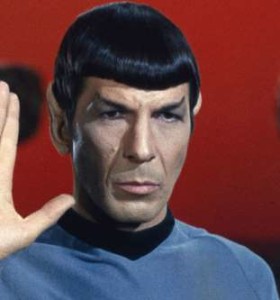Well another piece of my childhood is gone. Leonard Nimoy died Friday at the age of 83. While not quite the age of a mature Vulcan, he did indeed live long and prosper.
Forever associated with the half-human Vulcan Science Officer of the Enterprise, Nimoy’s TV career began the year I was born with an appearance on “Queen for a Day.” A show I barely remember but which might be counted as a proto-reality show.
He played Indians, cowboys, soldiers, sailors and cops. Though he reprized his Spock role throughout the rest of his life in Star Trek movies, an animated TV show, and self-referenced it on many guest spots on other geek series such as the Big Bang Theory, it was never set in stone. He created any number of other roles such as Paris on “Mission Impossible,” and Theo Van Gogh in the one-man stage play and TV movie “Vincent.”
He created the Vulcan nerve pinch, the envy of generations of martial artists who secretly believe if we could just get it right…
The story has it that Nimoy loathed having to do fight scenes and one day on set said, “Couldn’t I just pinch him on the neck or something?”
He also created, or rather popularized the ‘V’ shaped Vulcan greeting that goes with “Live long, and prosper.”
Nimoy was the child of Ukrainian Jewish immigrants who grew up bi-lingual, speaking both English and Yiddish. The hand gesture is a rabbinical blessing he explained. The shape of the hand resembles the Hebrew letter ‘Shin’ which is the first letter of several sacred words: Shaddai (one of the names of God), Shalom (a greeting which means “peace”) and Shekhinah (the feminine aspect of God created to live among men).
In later years Nimoy was active in the movement to preserve and pass on the Yiddish language.
But of course, he will always be Spock to those of us who loved him.
This is what Spock means to me, and how he helped shape my image of the man I wanted to be growing up.
Spock of course was highly intelligent. What was revealed as the character developed over the course of the series was that he was also extremely passionate, as apparently were all Vulcans not just half-humans. Spock mentioned Vulcan once had “an aggressive colonizing period, brutal even by human standards.” One colony became the warrior culture of the Romulan Empire.
This and his half-human heritage created tensions that made Spock pretty miserable. After one adventure on a planet full of hallucinogenic spores inhabited by blissed-out colonists he commented, “For the first time in my life, I was happy.”
The way Spock dealt with it, was self-control, duty, a wry sense of humor, and philosophy.
The code for self-control in the series, was “logic.” Spock evaluated situations in terms of logical or illogical. But you never saw him construct a syllogism or draw a Venn diagram. Spock expected the default behavior of rational beings to be self-control. Not letting the passions get the upper hand when their self-interest was at stake. Spock got flummoxed when sentient beings acted irrationally when it would better serve them to exercise a little self-control.
Duty, Spock was Science Officer of the Starship Enterprise, a position corresponding to Executive Officer on a Navy ship. Along with the captain, and often as acting captain he was responsible for the lives of hundreds of people. To fail in his duty could mean their deaths, or the deaths of innocent sapients of other species – or war.
Spock’s sense of humor was wonderful and oddly, rarely noted. He was the master of the dry rejoinder and the uplifted eyebrow, an expression that spoke volumes.
Once when Leonard “Doc” McCoy was searching for a cure for a malady that struck some of the crew, including himself, he utters in frustration, “I’m just an old country doctor.”
Spock, raised eyebrow, “As I always suspected.”
Philosophy, never explicitly expressed but shown in action as the best of philosophy always is.
Spock was not exactly a pacifist but committed to exhausting all non-violent, or at least non-lethal alternatives first. But he could argue for warlike action as in the first encounter with the Romulans, his ethnic kin.
Spock displayed real objectivity, not the counterfeit of non-evaluation so popular in academia today.
On one planet where wars were waged with computers, the ruler explained that those declared casualties were expected to report to be killed for real, and rationalized that this was how they avoided a potentially world-destroying conflict. And oh by the way, the Enterprise had been declared a casualty so would the crew please report to the killing booths?
“I understand,” Spock said.
“Ah you approve Mr. Spock!” the ruler said.
“No,” Spock replied. “I understand. I do not approve.”
Spock’s humor, sense of duty, and philosophical objectivity might have been summed up in one scene in the first season.
When parting with a woman he loved but could not be with, he told her, “If we all have our private purgatories, surely mine can be no worse than anyone else’s.”
“Mr. Spock,” she said, “I never even knew your first name.”
Spock smiles, “You couldn’t pronounce it.”
Beam him up Scotty.
“May his memory be a blessing.”


One Response to Beam him up, he’s leaving Earth